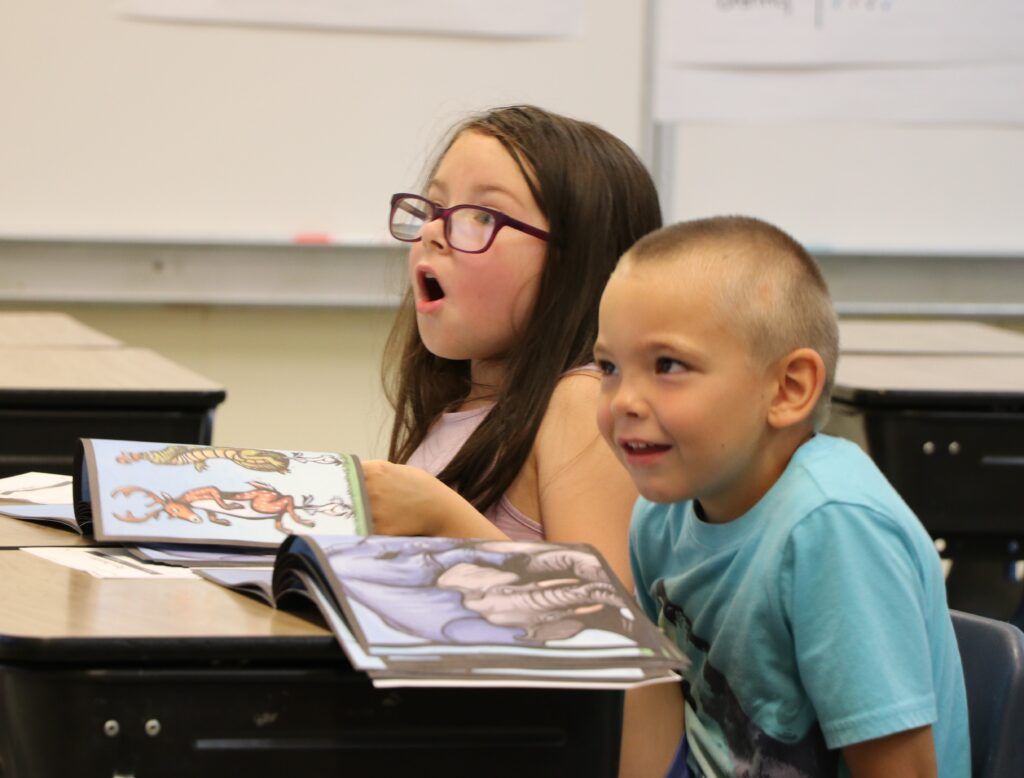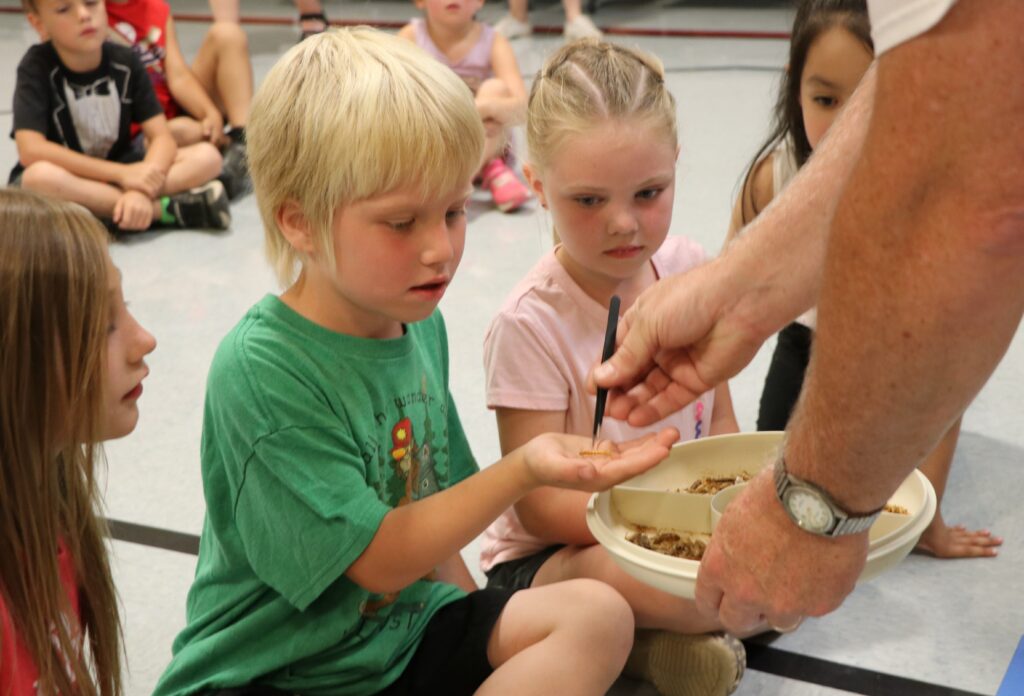
The South Umpqua School District made literacy fun during its summer learning camp with the help of new curriculum materials purchased with its Summer Learning Grant. (Photo by Jake Arnold, OSBA)
Canyonville School Principal Shilo White had to start planning the South Umpqua School District’s summer learning program before funding was even set.
By the time the district learned it was one of the fortunate recipients of an Oregon Summer Learning Grant, staff commitments had already locked in summer school dates of June 17 to July 3. But with the $329,000, the district was able to lengthen the days from half to full and add engaging activities that increased registrations and improved attendance.
“We definitely couldn’t have done it without the grant,” White said.
More than 60 school districts, education service districts and charter schools received $30 million in grants, ranging from $20,000 to $1.5 million. Education advocates are grateful for funding that will help reverse learning loss and close achievement gaps, only wishing it had been more and sooner.
“We know creating a program at the last minute is not ideal,” said OSBA Legislative Services Specialist Efren Zamudio. “Our districts continue to show they are nimble and can get things done that support students. Our job is to make this funding predictable and ongoing, so every summer can be a season for learning.”
OSBA and other school advocates fought for $50 million for a summer learning package developed by Gov. Tina Kotek and Rep. Susan McLain, rallying members to pressure the 2024 Legislature. The Legislature cut the amount to $30 million, significantly reducing the number of districts that could expect some sort of grant.
House Bill 4082 passed in March, and the Oregon Department of Education spun into high gear to determine grant amount details by early May.
When Oregon school districts receive additional funds, they can create targeted programs to close achievement gaps, support historically underserved student groups and address problems such as chronic absenteeism and low graduation rates. Heading into the 2025 legislative session, OSBA is focused on achieving adequate, reliable and sustainable funding for schools to increase all students’ success.
For South Umpqua, the Summer Learning Grant opened up whole new worlds for students.
South Umpqua is a high-poverty district that serves about 1,500 K-12 students from multiple communities along Interstate 5 south of Roseburg.
Tri City Elementary in Myrtle Creek and the South Umpqua High School across the road hosted the summer program. It registered about 165 incoming K-8 students, far more than recent summers. Students received daily classes in reading, math and science as well as alternating days of two lessons in music, art, physical education or social and emotional learning. The classrooms were mostly grouped by grade levels, and every classroom had a teacher and an instructional aide.
Ari Maloney, a Coffenberry Middle School counselor and the day-to-day coordinator, said one of the core goals was to work on essential skills students would need moving into their next grade level.
Lily Martin, a Myrtle Creek Elementary teacher who was leading the fifth-grade class, said the smaller setting allowed more flexibility for fun while still keeping children in a school routine a little longer.
The days included recesses, meals, activities, visiting speakers and field trips, such as to Wildlife Safari and the Elkton Community Education Center butterfly pavilion. The district partnered with the community to find enriching activities and experiences that would engage students.
“What can we give kids that families might not be able to?” White said. “The goal is to create an engaging program and recognize it’s kids’ summer and they want to do fun stuff.”

An Oregon Summer Learning Grant made it possible for the South Umpqua School district to bring in speakers to its summer learning camp, such as John Jackson from Bugs-R-Us Educational Services. (Photo by Jake Arnold, OSBA)
White said the district has struggled in the past to maintain student attendance in summer programs but this year the attendance stayed fairly steady.
As the camp neared its end, students certainly were excited about their learning.
A table full of fifth graders working on a math lesson with playing cards enthusiastically said the camp was engaging. They excitedly listed things they had learned about: gemstones, Venus flytraps, Native American cultures, robots, butterflies and more.
Makenzi Ireland particularly loved a field trip to Ashland’s ScienceWorks Hands-On Museum.
“It was sick,” she said. “We got to touch everything.”
In another classroom, first grader Sadrielle Ramirez-Bosch sat with pencil in hand and book open listening to a teacher’s reading lesson. She roared with laughter along with her classmates as the teacher turned the page on “My Friend Rabbit,” part of the new curriculum materials paid for by the grant.
White said the new math and literacy books fit lessons into a summer program’s short time. She said the lessons are scripted enough that teachers can step in for grades or subjects they don’t normally teach.
White plans to survey staff and students to find out what worked in the summer program and where improvements can be made. Next year, White would like to be able to start planning in January.
HB 4082 could help with that. The bill set up the Oregon 21st Century Community Learning Center Initiative Workgroup to advise the Oregon Department of Education on enhancing after-school and summer learning opportunities. The workgroup includes school board representation.
Education advocates, including OSBA, hope the workgroup can show a path to reliable and sustainable summer learning funding.
South Umpqua Superintendent Erika Bare said annual uncertainty of summer learning funding forces districts to rethink their programs each year, wasting time and money. A late start also makes it harder to work with families so they can fit their summer plans around school opportunities.
“If it was money we could count on, … we could put programs in place that are even more beneficial for our students,” Bare said.
Bare said students need these kinds of experiences over the summer to stay engaged in school and prevent the “summer slide” learning loss.
Bare said the district would like to have a similar program next year but that doing so would require a significant investment from the state.
“We were able to pull off an amazing program this year,” Bare said. “That now becomes an expectation.”
– Jake Arnold, OSBA
[email protected]